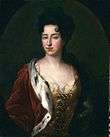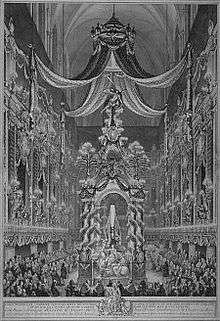Catherine Opalińska
| Catherine | |
|---|---|
|
| |
| Queen consort of Poland Grand Duchess consort of Lithuania | |
| Tenure |
1705–1708 1733–1736 |
| Coronation | 4 October 1705 |
| Born |
13 October 1680 Poznań, Poland |
| Died |
19 March 1747 (aged 66) Lunéville, France |
| Burial | Notre-Dame-de-Bonsecours, Nancy |
| Spouse | Stanisław I |
| Issue |
Anna Leszczyńska Maria, Queen of France |
| House | Opaliński |
| Father | Jan Karol Opaliński |
| Mother | Zofia Czarnkowska |
Catherine Opalińska (Polish: Katarzyna Opalińska; 13 October 1680 – 19 March 1747) was Queen consort of the Polish-Lithuanian Commonwealth twice and Duchess consort of Lorraine through her marriage with Stanisław I of Poland.
Biography
Catherine was the daughter of magnate Jan Karol Opaliński and his wife Zofia Czarnkowska. On May 10, 1698 in Kraków she married Stanisław Leszczyński, who became Duke of Lorraine and was, briefly, king of Poland (reigned as Stanisław I). In 1699, she gave birth to Anna Leszczyńska, and in 1703, to Marie Leszczyńska, the future spouse of Louis XV of France.
Queen
In 1704, her spouse was elected King of Poland after having been supported as a candidate by Charles XII of Sweden, who had at the time placed Poland under his occupation. Between November 1704 and July 1705, Charles XII had his headquarters at Rawicz, and the royal couple held court at Rydzyna Castle nearby, were queen Catherine hosted balls and masquerades for the Swedish power holders and welcomed the wives of the Swedish commanders stationed there, such as for example Christina Piper, who visited Carl Piper in Ravicz and were introduced at the Polish court at the same time.[1]
Exile
In 1709, her spouse was deposed when the Swedish army lost the military upper hand in Poland, and the family was by Charles XII granted refuge in the Swedish city of Kristianstad in Scania.[2] In Sweden, the family was welcomed by the Queen Dowager Hedwig Eleonora and became popular members of the society life on the estates of the nobility around Kristianstad: one of their acquaintances among the Swedish nobility were Christina Piper, whom they had met in Ravicz in 1705 and with whom they spent several months in Norrköping in the autumn of 1713.[3] In 1712, they also visited Medevi, the spa of the Queen Dowager.[4] In 1714, Charles XII gave them permission to live in the Swedish province of Zweibrücken in Germany, where they were supported by the income of Zweibrücken: they lived there until the death of Charles XII in 1718[5] Catherine, as well as her daughter queen Marie, maintained a political correspondence with Margareta Gyllenstierna, the spouse of Arvid Horn, with whom she had made the acquaintance during her stay in Sweden.[6]
After the death of Charles XII in 1718, they lived in Wissembourg in Alsace in France. Their lifestyle in Wissembourg was regarded as very below standard for a royal at that time; they lived in a small house, and could not pay the salary of their small retinue from which a few "served as an apology for a guard of honour", and the jewels of Catherine were reportedly held as security by a moneylender.[7]
Catherine Opalińska was described at this point as economical but bitter, and her relationship with Stanislaw was reportedly not happy at this point as she felt disappointment over the loss of a royal position and her exile and blamed this on the actions of Stanislaw, in which she was joined by her mother-in-law Anna Leszczyńska (1660–1727), who lived with them in exile.[7]
France
In 1725, her daughter Marie was chosen to be the queen of France, which made Catherine mother-in-law to Louis XV of France. After the wedding, Catherine and Stanisław resided at the Château de Chambord.[8]
In 1733, Stanislaw again took the throne of Poland during the War of the Polish Succession, making her queen of Poland for the second time. He abdicated the throne in 1736, however.
In 1737, her spouse was made Duke of Lorraine, which made Catherine duchess consort of Lorraine, and she was thereby installed at the Ducal court in Nancy. Until her death, however, she kept her title of Queen. As long as she lived, Stanisław reportedly benefited the Catholic church and the Jesuit order financially.[9] In contrast to Stanisław, Catherine did not adjust to life in France or Lorraine, but felt a certain bitterness over her exile,[10] and continued to long for Poland.[11] Catherine Opalinska was described as homely, pious and charitable, but also as a "dour" personality whom Stanisław regarded to be boring.[12] As soon as they were installed with their court in Lorraine, Stanisław took numerous mistresses, many among her ladies-in-waiting, such as Catherine Ossolińska and Anna Maria Ossolińska, Marie-Louise de Linanges, Madame de Bassompierre and Madame de Cambres, until from 1745 he had a permanent relationship with the marquise de Boufflers, all relationships which Catherine could not prevent.[13]
Death
When his mother-in-law, the spouse of the dethroned king of Poland, died in 1747, Louis XV ordered a commemorative ceremony, in her honour at Notre Dame Cathedral in Paris. The ceremony glorified the deceased who underwent a veritable deification.
Her tomb is in the church of Notre-Dame-de-Bonsecours, in Nancy, next to her husband and the heart of their daughter.
Gallery
 Portrait of Catherine Opalińska when Queen of Poland.
Portrait of Catherine Opalińska when Queen of Poland. The towers of the church in Sieraków were built in 1740 on her order.
The towers of the church in Sieraków were built in 1740 on her order.- Portrait by Jean-Baptiste Lemercier
 Pompe funebre for Catherine Opalińska in Notre Dame de Paris.
Pompe funebre for Catherine Opalińska in Notre Dame de Paris.- Funeral Monument of Catherine in Nancy
Ancestors
| Piotr Opaliński, voivode of Poznań | |||||||||||||
| Krzysztof Opaliński, voivode of Poznań | |||||||||||||
| Zofia Kostka | |||||||||||||
| Jan Karol Opaliński, castellan of Poznań | |||||||||||||
| Adam Sędziwój Czarnkowski, voivode of Łęczyca | |||||||||||||
| Teresa Konstancja Czarnkowska | |||||||||||||
| Katarzyna Leszczyńska | |||||||||||||
| Catherine Opalińska | |||||||||||||
| Kazimierz Franciszek Czarnkowski, castellan of Poznań | |||||||||||||
| Adam Uriel Czarnkowski | |||||||||||||
| Princess Konstancja Lubomirska | |||||||||||||
| Zofia Anna Czarnkowska | |||||||||||||
| Remigian Zaleski, Castellan of Łęczyca | |||||||||||||
| Teresa Zaleska | |||||||||||||
| Anna Miełżyńska | |||||||||||||
See also
| Wikimedia Commons has media related to Catherine Opalińska. |
References
- ↑ Norrhem, Svante, Christina och Carl Piper: en biografi [Christina and Carl Piper: a biography], Historiska media, Lund, 2010 (Swedish)
- ↑ Lundh-Eriksson, Nanna (1947). Hedvig Eleonora (in Swedish). Wahlström & Widstrand.
- ↑ Norrhem, Svante, Christina och Carl Piper: en biografi [Christina and Carl Piper: a biography], Historiska media, Lund, 2010 (Swedish)
- ↑ Lundh-Eriksson, Nanna (1947). Hedvig Eleonora (in Swedish). Wahlström & Widstrand.
- ↑ Lundh-Eriksson, Nanna (1947). Hedvig Eleonora (in Swedish). Wahlström & Widstrand.
- ↑ Norrhem, Svante (2007). Kvinnor vid maktens sida : 1632-1772. (Women alongside power: 1632-1772) Lund: Nordic Academic Press. Libris 10428618. ISBN 978-91-89116-91-7 (Swedish)
- 1 2 Latour, Louis Therese, Princesses Ladies And Salonnieres of The Reign of Louis XV, 1927
- ↑ Renata Tyszczuk: The Story of an Architect King: Stanislas Leszczynski in Lorraine 1737-1766
- ↑ The National Review, Volym 19.W.H. Allen, 1892
- ↑ Bogdan, Henry: La Lorraine des ducs
- ↑ Nesta H. Webster: The Chevalier De Boufflers (1916)
- ↑ Nesta H. Webster: The Chevalier De Boufflers (1916)
- ↑ Bogdan, Henry: La Lorraine des ducs
- ↑ Zamek w Sierakowie, Historia Zamku.
- This article is based on a translation of the equivalent article of the French Wikipedia on 7 March 2007
- Renata Tyszczuk: The Story of an Architect King: Stanislas Leszczynski in Lorraine 1737-1766
Further reading
- Zieliński, Ryszard (1978). Polka na francuskim tronie. Czytelnik.
| Catherine Opalińska Born: 13 October 1680 Died: 19 March 1747 | ||
| Royal titles | ||
|---|---|---|
| Preceded by Christiane Eberhardine of Brandenburg-Bayreuth |
Queen consort of Poland Grand Duchess consort of Lithuania 1705–1708 |
Succeeded by Christiane Eberhardine of Brandenburg-Bayreuth |
| Preceded by Christiane Eberhardine of Brandenburg-Bayreuth |
Queen consort of Poland Grand Duchess consort of Lithuania 1733–1736 |
Succeeded by Maria Josepha of Austria |
| Preceded by Maria Theresia of Austria |
Duchess of Lorraine 1737–1747 |
Succeeded by None |